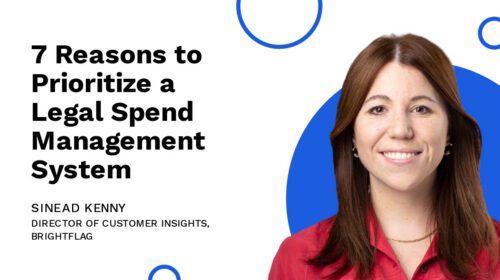What is Legal Expense Tracking?
A recent survey of legal operations professionals confirmed what many in the industry know: their most pressing challenges are cost containment, savings, and budget management.
The good news is there’s a way to address all of these challenges head-on and optimize legal spend through legal expense tracking.
In this article, we look at the key components of legal expense tracking and the best strategies and tools for using it successfully. By the end, you’ll understand how tracking in-house expenses can give you deeper visibility and greater control over your legal spend.
What is Legal Expense Tracking?
Legal expense tracking is the process of recording, monitoring, and managing all costs related to your legal operations.
Expense tracking takes into account:
- Internal expenses like salaries, benefits, professional registrations, training, and technology. These expenses are usually tracked through your company’s accounting and HR software.
- External expenses, such as outside counsel, including their fees and other costs like travel and courier fees. These expenses are best tracked with the help of e-billing software like Brightflag that is specialized for legal teams.
Tracking expenses is key to gaining visibility into and managing legal spend. When done correctly, it helps you understand cost drivers and puts you in a position to optimize resources and forecast more accurately.
With organizations’ median legal spend amount increasing from $2.4 million in 2022 to $3.1 million in 2023, effective legal expense tracking is a priority for in-house teams looking to control costs and maximize efficiency.
Key Components of Effective Legal Expense Tracking
Including the following features in your legal expense tracking strategy ensures you have complete visibility into and control over your legal spend:
- Legal e-billing: Legal e-billing software helps your in-house team achieve consistency and accuracy in its expense tracking, especially when dealing with large volumes of outside counsel invoices. Automating the invoice submission and approval process also saves you time and money while reducing the risk of human error.
- Legal spend reporting and analytics: Insights into legal expense patterns and trends support data-driven decision-making by highlighting ways to reduce costs and optimize resources.
- Vendor management: Monitoring and assessing vendor costs, billing compliance, and performance helps ensure you get the best value for your legal spend.
- Centralized expense tracking: By consolidating your legal expenses in one place, instead of gathering data from scattered sources like invoices, spreadsheets and emails, you get a full overview of all costs in real-time.
- Automation for the application of billing guidelines: This ensures guidelines are applied consistently across all invoices and any non-compliance is immediately flagged for follow-up.
How to Effectively Track Legal Expenses as an In-House Team
Here’s how you can optimize your legal expense tracking.
Assess Your Current Expense Tracking Management System
Start by looking at what tools you use today to track legal expenses, and where your system does and doesn’t work. Many in-house teams find that once they have over $1 million dollars in outside counsel spend per year to manage, processing legal expenses through the company’s Accounts Payable (AP) system becomes inefficient, and specialized legal billing software that can streamline invoice review and report on spend by matter becomes necessary.
However, as you review your current tools and process, you may identify other areas that need to be improved.
Questions to ask when reviewing your current system include:
- Can you access real-time legal expense data, or is there a delay preventing you immediately accessing legal spend insights?
- Are vendor invoices consistent and compliant with your billing guidelines?
- Can you generate detailed legal expense reports for insights into your legal spend and ways to reduce costs?
Establish and Apply Billing Guidelines
Standardizing your billing processes for outside counsel ensures a consistent approach, making expense tracking more accurate, streamlined, and insightful. As a result, invoices are easier to review, saving your in-house team time and money.
Start by creating a standardized set of billing guidelines for outside counsel. These establish clear expectations around which expense categories you agree to pay for, and which should be considered as non-billable overhead for your firms. They also establish invoicing and timekeeper rate submission processes so that your team receives information in a timely and effective manner. You can leverage AI to automatically apply these guidelines to each invoice to further streamline the review process.
Note that billing guidelines are not a “set it and forget it” resource. Once they’re in place, you should regularly review them to ensure they continue to support your in-house team’s goals as well as broader organizational objectives.
Analyze Expense Reports
Analyzing expense reports is a valuable exercise for several reasons. Firstly, billing guidelines aren’t worth the paper they’re written on if they’re not followed. Frequent audits of your expense reports enable you to identify vendors that routinely breach your guidelines, and to use this data to ensure vendor compliance going forward.
Regular reviews are also helpful in identifying expense trends. Key metrics and KPIs such as cost per matter, average hourly rate, total costs of services, and legal spend as a percentage of revenue offer insights into what is and isn’t working.
For example, a sudden increase in outside counsel fees could indicate an increase in your staff’s workload or a vendor charging more than agreed. With this information, you can identify the cause and develop strategies for better expense tracking.
Leverage Legal Expense Tracking Software
The most effective way to streamline legal expense tracking is to use purpose-built software like Brightflag.
Why? The right software can streamline expense tracking, giving you complete visibility over legal spend while reducing the risk of errors.
Complete Visibility
Manually tracking your legal expenses gives you limited visibility into the current financial state of your legal team. It also results in essential details being overlooked or lost, making it difficult to understand legal spend accurately.
This lack of visibility impedes financial decision-making. It’s hard to forecast, manage budgets, and identify cost-saving opportunities without the right data to hand. It also presents challenges when trying to illustrate how certain legal expenses are actually value-add activities and showcase to management that in-house legal is more than a cost center.
With legal expense software, you’re able to integrate all sources of legal expense tracking information to give you a full picture of your legal spend in real-time. It also includes reporting and analytics features that offer insights into your costs and ways to optimize legal spend.
Automated Legal Expense Tracking
Relying on manual processes or outdated technology makes legal expense tracking inefficient and prone to errors. And having your in-house team spend more time double-checking invoices and budgets than on substantive work isn’t productive for anyone.
That’s why legal expense tracking software is the ideal solution. Platforms like Brightflag can automatically give insights into your legal spend KPIs, review outside counsel invoices, and prepare legal expense data for finance. This streamlines your workflows, saving your in-house team time and money.
Reduced Risk of Misclassification
Misclassification of invoice line items is inevitable with manual expense tracking. Even when using standardized systems like the Uniform Task-Based Management System (UTBMS) or American Bar Association (ABA) codes, attorneys might categorize legal costs differently, so the process is prone to human error. This leads to mistakes and inconsistent expense reporting, making it difficult for in-house teams to truly understand matter costs and the optimal resourcing profile for different kinds of work.
The solution? Technology like Brightflag uses AI to automatically classify each legal expense using a consistent, comprehensive and error-free codeset. This reduces the risk of misclassification and creates a dataset that can be relied upon for strategic decision-making.
Use Brightflag to Track Legal Expenses and Manage Legal Spend
Brightflag centralizes and streamlines your legal expense tracking, giving you total visibility over legal spend. Its AI-powered features help ensure accurate tracking by reviewing invoices according to your outside counsel guidelines and generating reports with actionable insights into your costs.
To learn more about how Brightflag can help you track expenses and manage legal spend, book a demo today.
FAQs
What are the benefits of legal expense tracking software?
Software automates and streamlines legal expense tracking, saving you time and money. It also helps you track expenses more accurately from a central system, giving you greater visibility into your legal spend to manage costs and budgets better.
What qualifies as a legal expense?
For in-house teams, legal expenses are any costs associated with the teams’ functions and activities. These include internal costs such as legal staff salaries and benefits, professional registrations, and training, as well as external costs like outside counsel, including their professional fees, travel costs, and administrative expenses.



